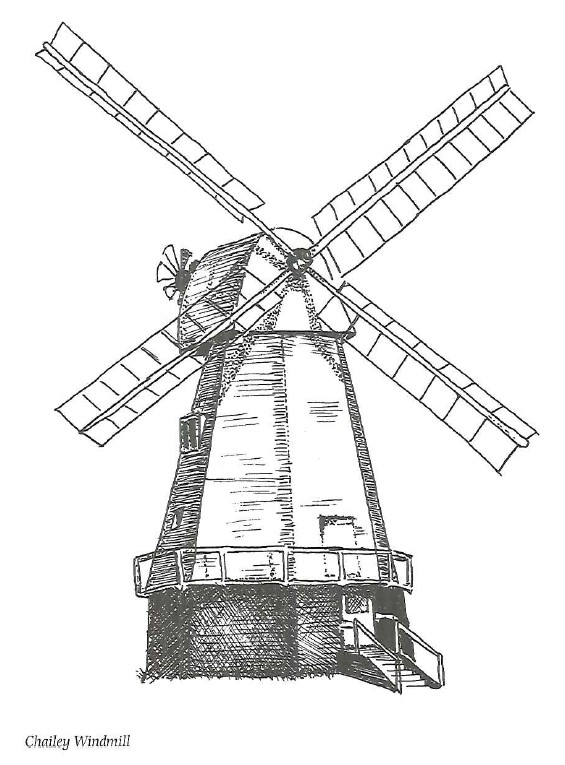A village which in its own humble way was said to resemble Rome, because the parish rests upon seven hills: Stone Hill, Gun Hill, Thunders Hill, Burgh Hill, Holmes Hill, Scrapers Hill and Pick Hill.
There was nothing humble about the Jefferay family, the old lords of the manor, whose pride was a byword. To stop their feet from getting soiled on the way to church they had a line of cheeses laid from their mansion to the church door to use as stepping stones. Some older residents will assure you that the story must be true because the impressive Jefferay monument in the church depicts two of the Sussex Marble figures standing upon round tablets like gigantic cheeses. The 18 feet high tomb is of Sir John Jefferay, Queen Elizabeth’s Lord Chief Baron of the Exchequer, his wife and their daughter. Sadly, it has been much defaced, the theory being that somebody mistook the worthy Sir John for Judge Jeffreys of ‘Bloody Assize’ infamy.
The Jefferays lived at Chiddingly Place and legend said a crock of gold was hidden in a gallery there, sat upon by an evil spirit guardian in the shape of a black hen. A yokel plucked up the courage to dislodge the hen and make off with the treasure but the bird knocked him senseless and flew in a fury through the great east window of the hall, pushing two iron bars out of shape on the way. The rustic never recovered from the experience; far from becoming rich he went out of his mind and had to be rocked in a cradle like a baby for the rest of his days.
Stone spires are a rarity in Sussex. There are only three and Chiddingly’s is the best, a matter of pride which in recent years prompted the villagers to rally round and raise a massive sum for restoration work. It stands 130ft high, a gut-wrenching thought for vertigo sufferers but a fact that did not bother one adventurous local when the vane was regilded in the 1890s. He climbed to the top of the spire and balanced on his head on the apex to the excitement of the spectators on terra firma.
It was in the church belfry that the body of William French lay after being exhumed. Tongues were wagging in the village about his sudden death in January 1852 and a full post mortem examination was carried out. It established that he had died of arsenic poisoning.
The notorious Victorian crime of passion became known as The Onion Pie Murder because French’s wife Sarah administered the deadly dose in his favourite supper. She had fallen for a younger man, James Hickman, and decided to do away with hubby. The tiny woman (she was only 4ft 10ins in height), who had the reputation of being a loving wife, caring mother and good neighbour, was hanged before a crowd of more than 3,000 at Lewes on 10 April 1852. Her body was placed in a lead coffin and buried within the outer walls of the town’s prison.
John-Clifford Russell, born at Chiddingly in 1791, overcame the disadvantages of his birth to establish a mighty business empire. His mother was an unmarried 15-year-old, but he studied hard, became a cordwainer and went on to give his name to the nationally known shoe retailing business of Russell and Bromley.
Chiddingly had its own drinking song, in rather dubious taste, which refers to the great estate of Peaks and of Perryland, just over the parish boundary:
“My daddy was a good ol’ man, He left me Peaks an’ Perrylan’, But in the space of twenty year, I spent it all on gin and beer.’
There is singing in abundance here every year during the Chiddingly Festival, a week long celebration of the arts featuring everything from music and drama to painting and films. The locals even became film stars themselves, immortalised by local director Tony Penrose in his record of a year in the life of the village. His father was the late surrealist artist and art collector Sir Roland Penrose, who once had a painting turned down by the Royal Academy because it incorporated a poem with a swear word in it. Sir Roland successfully submitted another, which showed hands signalling a four-letter word in deaf-and-dumb sign language.
The great Sussex historian Mark Antony Lower was born in Chiddingly, where his father was the village schoolmaster. Dad was something of a writer himself and also a slave of the weed, a fact he laments in ‘The Old Smoker’s Six Reasons for Breaking his Pipe’, which concludes:
“Farewell, broken pipe; King Tobacco, adieu!
No longer I bow in submission to you; Those pleasures I seek that are lasting and free,
Which vainly are sought for in tyrants like thee; I revoke my allegiance to thy petty reign; Thy sceptre I’ve broken – I’ll not smoke again!’
